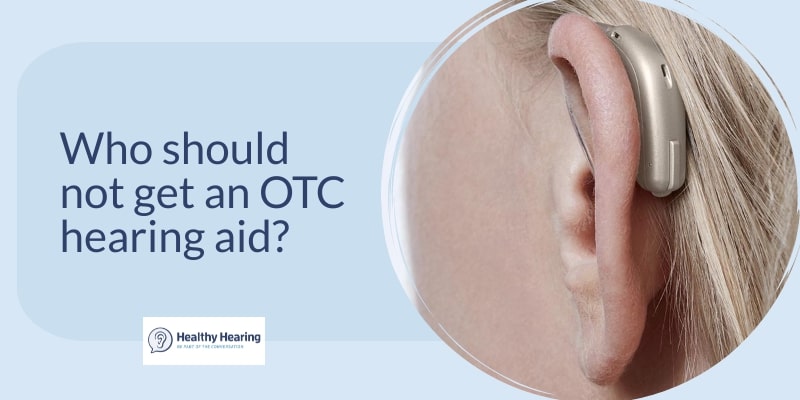|
www.HealthyHearing.com |
Who should not get an over-the-counter hearing aid?Reasons you might be better off with professionally fitted hearing aids
Contributed by Amy Sarow, AuD, clinical audiologist With the recent FDA approval of over-the-counter (OTC) hearing aids, there has been a lot of excitement about the potential for easier access and lower prices. However, the FDA has made it clear that OTC hearing aids are not a one-size-fits-all solution. Instead, for some people, the better option is to skip the drugstore hearing aids for professionally fitted hearing aids, aka "prescription" hearing aids. These types of hearing aids are available from clinics staffed by audiologists and/or hearing instrument specialists. When visiting a hearing clinic, you can expect a comprehensive hearing test and a personalized treatment plan. Who should not get OTC hearing aids?So how do you know if OTC hearing aids won't work for you? This is by no means a comprehensive list, but here are some of the top reasons:
Medical reasonsSevere or profound hearing lossOTC hearing aids are only intended for people with mild to moderate hearing loss. People with severe or profound hearing loss need specialized high-powered hearing aids, or surgically implanted devices like cochlear implants. Do you struggle to hear normal conversational speech, even in quiet environments? If you have severe or profound hearing loss, you will likely need a more powerful device that can only be obtained through a licensed professional. History of ear infections or fluctuating hearing lossPeople with a history of chronic ear infections or fluctuating hearing loss should seek the help of a hearing care professional. Why? Your ear anatomy and hearing loss may present unique challenges that require earmolds or other custom-fit hearing aids. Children and teens (early-onset)OTC hearing aids are not designed for children with hearing loss. Kids' hearing aids need to be programmed and optimized to help them do their best in school. Additionally, children's ears change shape as they grow, requiring custom ear pieces and specialized pediatric hearing aids, and hearing aids for teens. Sudden-onset hearing lossAnyone with a sudden change in hearing should immediately seek medical advice from an ENT or emergency department. A sudden hearing loss can be a sign of another medical problem and should be evaluated, especially if accompanied by dizziness and/or tinnitus (ringing in the ears). If treated promptly, it is possible to restore hearing. If hearing is not restored, you will likely need prescription hearing aids from an experienced provider. Unilateral (one-sided) or asymmetrical hearing lossIf you have hearing loss in both ears but one ear hears better than the other, an OTC hearing aid is not a suitable treatment option. The same is true if only one ear has hearing loss. Instead, the first step should be to see an audiologist or ENT to rule out other medical conditions that can cause this type of hearing loss. After that is done, specialized hearing aids can address your unique type of hearing loss. Unusual ear canal geometryPeople with very narrow ear canals, curvy ear canals, or surgical ears, should consult with a professional before considering an OTC hearing aid. In most cases, a more customized earmold will be more effective and more comfortable. Additionally, if retention is a concern, an audiologist is able to make adjustments to keep your hearing aid comfortably in place. Personal reasonsEven if none of the above apply to you, you can still see a hearing care professional for specialized hearing care. Some common "personal" reasons people seek in-person care: Technologically challengedDo you have difficulty using an app on a Smartphone? Struggle to keep up with technology? You'll do best with a traditional hearing aid from a licensed professional who can help you with special features like custom programs, Bluetooth connectivity help, or assistive listening devices like a remote microphone. Prefer professional evaluationWhen considering OTC, it’s also important to ask yourself how comfortable you are with fitting your own devices independently. A professional hearing evaluation provides objective information regarding the degree of your hearing loss as well as which treatment options will work best for you. From there, it’s much easier to make the most appropriate choice, which may include OTC. You're not sure if you have hearing lossMost age-related hearing loss is so gradual and progressive it can be hard to appropriately judge how much you’re missing out on. The above survey found that 68% of those with audiometric hearing loss didn’t notice any hearing difficulty. Meaning that by the time hearing loss is noticeable, a person may have developed a moderate or more severe hearing loss. For this reason, it's a good idea to at least have a professional hearing test prior to pursuing OTC or prescription hearing options. Are OTC hearing aids similar to reading glasses?OTC hearing aids and reading glasses both provide assistance to people with impaired vision or hearing, but they differ in a few key ways. "Readers" are available over-the-counter, do not require a prescription, and work for a certain subset of the vision-impaired population. Likewise, OTC hearing aids are self-fit devices that do not require a prescription to purchase and use. The key way they differ is how they relate to the brain.
Hearing is a complex brain processSpecifically, hearing aids involve a more extensive neurological adjustment period. This is why some hearing clinics offer auditory training and other therapeutic services that make wearing hearing aids easier (instead of ending up unused in a drawer). Also, figuring out your degree and type of hearing loss is more complex than figuring out reading glass magnification, so it can be beneficial to have hands-on support from an audiologist or other professional in that process to make adjustments and provide assistance. For those with Medicare, a hearing evaluation is generally covered with a physician referral, and it’s a great way to test your hearing loss as well as speech clarity. Other types of insurance coverage will vary, and you’ll want to check with your insurance provider regarding this benefit. What happens at a professional hearing care appointment?The traditional hearing aid process consists of a trip to an audiologist or hearing instrument specialist for a comprehensive hearing evaluation, followed by a discussion and selection of an appropriate treatment option for the person’s hearing loss. A hearing aid fitting is then scheduled to personalize the settings to the person's unique pattern of hearing loss. Your hearing specialist will also teach you how to insert and clean the devices, as well as connect them to a phone (if desired). OTC is self-fit and buyer-bewareOTC hearing aids can be purchased without a hearing evaluation or fitting appointments from a hearing care professional. As of October 17th, 2022, OTC hearing aids are available at major retailers like CVS and Walgreens and online. These devices are fully self-fit, meaning that the user controls the volume to a level they feel is appropriate. Just like with other health products sold to the public, it's buyer-beware. More: Can my pharmacist help me with OTC hearing aids? Either way, there are many health benefits of hearing aidsWhether you go for OTC hearing aids or seek prescription hearing aids from a hearing aid clinic near you, it's an important first step in your hearing health journey. When worn correctly, hearing aids offer many health benefits—not only will you hear better, you're helping your brain avoid future auditory deprivation. To find an experienced hearing care provider near you, you can search our directory of consumer-reviewed clinics. Amy Sarow, AuD, clinical audiologist
Related Help Pages:
Hearing aids Types of hearing aids Technology Bluetooth Fitting Prices Medicare Cleaning Accessories Children's hearing aids
|
Featured clinics near me
Earzlink Hearing Care - Reynoldsburg
7668 Slate Ridge Blvd
Reynoldsburg, OH 43068

Find a clinic
We have more hearing clinic reviews than any other site!



.jpg)
 Dr. Amy Sarow obtained her Doctor of Audiology at the University of Iowa and spent her 4th year residency at the Mayo Clinic School of Health Sciences in Jacksonville, Florida. Dr. Sarow currently serves as Audiology Lead for Soundly.com and is a Forbes Health Advisory Board member.
Dr. Amy Sarow obtained her Doctor of Audiology at the University of Iowa and spent her 4th year residency at the Mayo Clinic School of Health Sciences in Jacksonville, Florida. Dr. Sarow currently serves as Audiology Lead for Soundly.com and is a Forbes Health Advisory Board member.